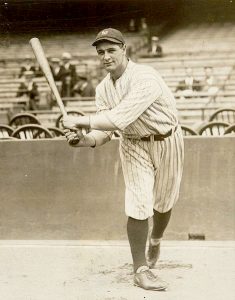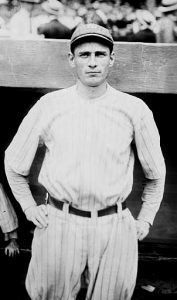One of the greatest stories about luck…well, wasn’t exactly true. It’s almost as if we refuse to believe we make our own luck as Roman philosopher Seneca stated, “Luck is what happens when preparation meets opportunity.” In business and in sport, we want to believe someone was lucky, as if we want to blame someone for success. After all they certainly did not deserve that promotion or victory. The Hall of Famer Lou Gehrig replacing Wally Pipp for the New York Yankees is one of those ‘lucky’ stories that in the end; actually validated Seneca’s quote.
One story, not sure who started it, claimed Gehrig got his big break when Wally Pipp, the Yankees’ regular first baseman since 1915, sat out a game with a headache.
Wally, maybe upset, embarrassed, or wanting to justify failure claimed he was hit in the head by Charlie Caldwell during batting practice, lost consciousness and rushed to the hospital. As if that was not enough, Wally insisted the concussion was so severe he was in the hospital for two weeks and by then it was too late. Lou was on fire and had already established himself as the new, ten years younger Yankee first baseman. Now that is some LUCK, but…unfortunately it is not true.
As with most ‘luck-stories’ the truth is not as compelling, just factual. How boring is that!
As my grandmother would say, “truth be-told” Manager Miller Huggins decided to shake up his line-up and replace some of his slumping veterans with younger players during the middle of the 1925 season (Yankees Win/Loss record was below 500 and they were falling drastically in the standings). You guessed it, Wally Pipp was one of those slumping veterans! Snopes.com stated, “In the case of Wally Pipp there was no inopportune headache, no “delightful and romantic story” — just a case of a slumping player who lost his job to an up-and-comer and never got it back.” As what often happens, we avoid reality and feel better transferring blame!
Regardless of which story you want to believe, there was a definite drop in his production. In 1924 Wally batted .295, had 19 Triples and was 14th in the MVP voting, but in 1925 he had dropped considerably.
|
Games |
At Bats | Hits | Triples | Batting Average |
| 62 | 178 | 41 | 3 |
.230 |
Simply put, Lou Gehrig was given the opportunity and took advantage. In fact Wally Pipp, a player overshadowed by Lou Gehrig was actually a very good player. When he was traded to Cincinnati, Wally return to his talented ways, but in the end validated Seneca’s quote.

Even though the Iron Horse became part of a legend that mixed fact with fiction, Lou Gehrig was lucky inasmuch as he was prepared and when the opportunity presented itself. He took over the position and never looked back! That is, until May 2, 1939 when Lou Gehrig benched himself for poor play, only to find out he had amyotrophic lateral sclerosis (ALS) now known as “Lou Gehrig’s Disease,” calling himself the Luckiest Man on Earth, dying two years later. Yet, in his farewell speech he claimed he had a lot to live for.
Until next blog may I suggest you sign-up never miss another blog!
Click Here to receive the Blogs Automatically
Al McCormick


